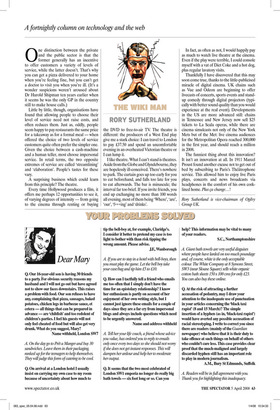O ne distinction between the private and the public sector is
that the former generally has an incentive to offer customers a variety of levels of service, while the latter doesn’t. That’s why you can get a pizza delivered to your home when you’re feeling fine, but you can’t get a doctor to visit you when you’re ill. (It’s a wonder suspicions weren’t aroused about Dr Harold Shipman ten years earlier when it seems he was the only GP in the country still to make house calls.) Little by little, though, organisations have found that allowing people to choose their level of service need not raise costs, and often reduces them. Just as, oddly, people seem happy to pay restaurants the same price for a takeaway as for a formal meal — when offered the choice of two levels of service customers quite often prefer the simpler one. Given the choice between a cash-machine and a human teller, most choose impersonal service. In retail terms, the two opposite extremes of service are called ‘streamlining’ and ‘elaboration’. People’s tastes for these vary.
A surprising business which could learn from this principle? The theatre.
Every time Hollywood produces a film, it offers me perhaps 12 opportunities to see it, of varying degrees of intensity — from going to the cinema through renting or buying the DVD to free-to-air TV. The theatre is different: the producers of a West End play give me a stark choice: I can travel to London to pay £37.50 and spend an uncomfortable evening in an overheated Victorian theatre or I can lump it.
I like theatre. What I can’t stand is theatres. Aside from the Globe and Glyndebourne, they are hopelessly ill-conceived. There’s nowhere to park. The curtain goes up too early for you to eat beforehand, and falls too late for you to eat afterwards. The bar is minuscule; the interval far too brief. If you invite friends, you end up exchanging no more than 100 words all evening, most of them being ‘Where’, ‘are’, ‘our’, ‘f***ing’ and ‘drinks’. In fact, as often as not, I would happily pay as much to watch live theatre at the cinema. Even if the play were terrible, I could console myself with a vat of Diet Coke and a hot dog, plus regular lavatory visits.
Thankfully I have discovered that this may soon come true, thanks to the little-publicised miracle of digital cinema. UK chains such as Vue and Odeon are beginning to offer livecasts of concerts, sports events and standup comedy through digital projectors (typically with better sound quality than you would experience at the real event). Developments in the US are more advanced still: chains in Tennessee and New Jersey now sell $25 tickets to La Scala operas, while there are cinema simulcasts not only of the New York Mets but of the Met: live cinema audiences for the Metropolitan Opera reached 300,000 in the first year, and should reach a million in 2008.
The funniest thing about this innovation? It isn’t an innovation at all. In 1911 Marcel Proust found another excuse not to get out of bed by subscribing to Paris’s Théâtrophone service. This allowed him to enjoy live Paris plays, concerts and news broadcasts via headphones in the comfort of his own corklined home. Plus Va change...!
Rory Sutherland is vice-chairman of Ogilvy Group UK.


































































 Previous page
Previous page